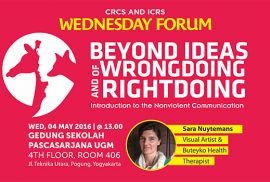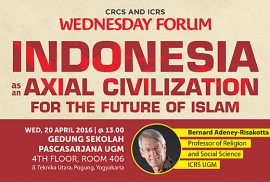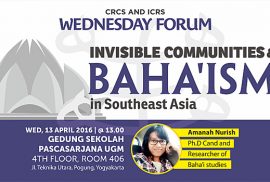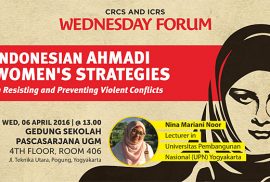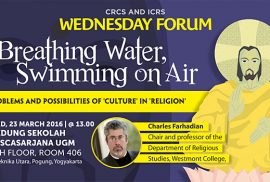
Abstract
For most of us, it’s in difficult moments — in an inner / personal /professional conflict — when it’s clear how our communication habits can keep us from the extraordinary relationships we really want with others and with ourselves. Millions of people struggle every day sharing what they feel or want in a way that can really be heard. We simply haven’t been taught the effective communication skills, emotional vocabulary, or self-awareness needed to get “unstuck” in those challenging moments, or to prevent those moments from happening in the first place. Nonviolent Communication is about learning to communicate with compassion towards self and others leading to trust and nurture.
Speaker
Sara Nuytemans is recognized as a visual artist, meditation teacher, Buteyko health therapist, and the founder of Soul Living in Yogyakarta. Having studied various style of meditation and dance expression methods, she facilitates two-day interactive workshops on ‘Connected Communication’ based on the Nonviolent Communication teachings of Dr. Marshall Rosenberg to raise awarness about communication patterns and the impact these patterns have on ourselves and others.
Wednesday Forum

Abstract
Elsewhere argued that the line divides the “real,” offline realm and cyberspace is blurred. Both realms are becoming interpenetrative and as demonstrated in many cases such as the Arab Springs, the United States and Indonesian Presidential elections, the composite power of the two may determine the socio-political direction of a region. Following this observation and considering the dramatic expansion of Indonesian cyberspace, in term of internet penetration, mobile subscription, and social media fluency, it is timely to look closer to it as an emerging religious public sphere. The present presentation focused on the younger generation religious expression. Younger generation, the “Millennials” generation (18-34 years old) as some researches framed it, is considered among the main steams behind this space, among others as the arena of their quest for individuality, and to a degree for the enhancement of their piety. Indonesian cyberspace is complicated with the audacity of religious expression and the tangled governance by the state in the post-New Order, hence understanding younger generation perception on religion might reveal the shifts that are happening in the Indonesian society. The preliminary assessment of the issue displayed a nuanced and complex presentation of religiosity of this generation, beyond the argument of superficiality, put forward by some other observations. It is furthermore showed an intersection issue of religious authority, imagery of pluralistic society, and transnational religious phenomena.
Speaker
Leonard C. Epafras is a core doctoral faculty in the Indonesian Consortium for Religious Studies, UGM Graduate School, Yogyakarta. He won the Endeavour Scholarship Fellowship 2015 to conduct his post-doctoral research as well as presented the ongoing research project initiated by the ICRS, the Indonesian Interfaith Weather Station (IIWS). His research interests are including history of religions, inter-religious interaction, and digital humanities/humanities computing.

Abstract
In this presentation I will explore Robert Bellah’s idea that there were four great axial civilizations which formed the modern world: China, India, Middle Eastern/Abrahamic and Greco-Roman/European. I will suggest that Indonesia occupies a unique role in the modern world because it is not dominated by any one of the 4 axial civilizations but is rather a unique synthesis of all four. Most great nations in the world are dominated by one or two, of these four axial civilizations. My research suggests that most Indonesians hold values and an imagination of social reality which is shaped by all four axial civilizations. In our pluralistic world, Indonesia may hold the key for shaping an Islamic civilization which will bring blessing to the entire world.
Speaker
Bernard Adeney-Risakotta is Professor of Religion and Social Science and International Representative at the Indonesian Consortium for Religious Studies (ICRS-Yogya), in the Graduate School of Universitas Gadjah Mada. He is currently also teaching at Duta Wacana Christian University and Universitas Muhamadiyah Yogyakarta. Bernie completed his B.A. from University of Wisconsin in Asian Studies and Literature. His second degree, a B.D. (Hons.) is from University of London, specializing in Asian Religions and Ethics. Bernie’s Ph.D. is from the Graduate Theological Union (GTU) in cooperation with University of California, Berkeley, in Religion, Society and International Relations. From 1982 until 1991 he taught at the GTU Berkeley. Bernie has been a Fellow at St. Edmunds College, Cambridge and at the International Institute for Asian Studies (IIAS), Amsterdam. From September 2013 to July 2014 he was on sabbatical leave as a Visiting Fellow at the Institute on Religion and World Affairs at Boston University. He has many publications, including: Just War, Political Realism and Faith (1988), Strange Virtues: Ethics in a Multicultural World (1995), Dealing with Diversity: Religion, Globalization, Violence, Gender and Disasters in Indonesia (2013) and Visions of a Good Society in Southeat Asia (in press, 2016). Email: baryogya@gmail.com

Abstract
The spread of religious millenarianism in the member states of the Association of Southeast Asian Nations (ASEAN) has raised significant questions about religious movement in those countries. The Baha’i religion provides an important case and relevant context as the Baha’i movement has been paralyzed in its country of origin, Iran, since the beginning of the movement in 1844. To avoid persecution and violence, many Baha’i adherents moved to other regions in Southeast Asia. The Baha’i religion is committed to developing educational skills, economic sustainability, gender empowerment, and social movements. Thus, ASEAN encompasses a dynamic and diverse region that aims to provide social, religious, economic, and cultural security for ASEAN citizens. Minority religions such as the Baha’i community, which at the times are victims of conflict and violence, play an important role in achieving those aims. Conversely, religious violence and conflict may be seen as part of the regional deficit in terms of religious freedom and tolerance. In this context, my study tries to examine religious millenarianism and the future evolution of the ASEAN community. The study investigates the co-existence of the Baha’i community with other religious groups such as Muslim, Christian, and Buddhist in their social, political, and cultural negotiations. As the Baha’i engage on some social and political issues in globalization and embrace liberalism and pluralism in the public space, I argue that this study contributes to scholarship in terms of understanding the fate of religious millenarianism in the future of the ASEAN community.
Speaker
Amanah Nurish Ph.D Cand Researcher of Baha’i studies. She is pursuing doctorate at ICRS UGM-Yogyakarta and working as consultant of USAID team-Washington for assessment program, “Fragility and Conflict”. She wrote book chapters, articles, and journals. Her latest publications: Sufism and Baha’ism: The Crossroads of Religious Movement in Southeast Asia (2016, Equinox publisher, London) Perjumpaan Baha’i Dan Syiah Di Asia Tenggara (2016, Maarif Jurnal, Jakarta) Welcoming Baha’i: New Official Religion In Indonesia (2014, The Jakarta Post) Social Injustice and Problem Of Human Rights In Indonesian Baha’is Community (2012, En Arche Journal, Yogyakarta) etc. She received prestigious awards for her academic works such as King Abdullah Bin Abdulazis’s interfaith center-Vienna, SEASREP-Philippine, ENITS-Thailand, Luce & Ford Foundation-USA, ARI-NUS, etc. With her teamwork, she is currently undertaking a broader anthropological research on “ Religious Millenarianism in ASEAN countries” for publication supported by Arizona State University of America.
Abstract
The Indonesian Ahmadiyya community has been facing violent conflicts after the Reformasi era. This dissertation focuses on the narrative of Ahmadi women about their experiences in dealing with daily conflicts they face in relation to their faith. This paper focuses on the acts of the Ahmadi women organization called Lajnah Imaillah from 2000 to early 2015 by examining their defense mechanism and exercising agency in resisting and preventing conflicts. The study was conducted in four areas in Indonesia, Kuningan in West Java, Yogyakarta, Lombok in West Nusa Tenggara and Head Office of Lajnah Imaillah in Bogor. The informants were Ahmadi women from different socio economics status and positions in the organization. Using narrative inquiry, this research found out that in responding and resisting to violent conflicts, Lajnah Imaillah has been changing its way of resistance and its forms of defense mechanism. The conflicts that Ahmadi women face have encouraged them organizationally and individually to be more actively participate in wider society and build good relationships with the religious others outside of the community. Therefore this paper argues that non-violent defense mechanism promotes better relations and mutual understanding among conflicting parties in society.
Speaker
 Nina Mariani Noor just earned her Ph.D from Inter Religious Studies, ICRS (Indonesian Consortium For Religious Studies) Universitas Gadjah Mada last January. Her concern is on conflict resolution, gender, and minority studies. Nina is Programme Executive Globethics.net Indonesia (www.globethics.net) . Globethics.net is the biggest, global online platform dedicated to promote inclusive, values-driven transformation for sustainable living, through access to knowledge, networking, collaborative research, training and events. She also teaches in Universitas Pembangunan Nasional (UPN) Yogyakarta this semester.
Nina Mariani Noor just earned her Ph.D from Inter Religious Studies, ICRS (Indonesian Consortium For Religious Studies) Universitas Gadjah Mada last January. Her concern is on conflict resolution, gender, and minority studies. Nina is Programme Executive Globethics.net Indonesia (www.globethics.net) . Globethics.net is the biggest, global online platform dedicated to promote inclusive, values-driven transformation for sustainable living, through access to knowledge, networking, collaborative research, training and events. She also teaches in Universitas Pembangunan Nasional (UPN) Yogyakarta this semester.

Abstract
One of the great debates among religious believers is about the relationship between their religion and culture. Is culture an obstacle to religion or is culture its vehicle? This lecture explores the cultural issues within Christianity and the problem and possibilities of the concept of culture to understanding religions. Related themes of history and globalization will be considered.
Speaker
Charles Fahardian, Ph.D is chair and professor of the Department of Religious Studies, Westmont College, Santa Barbara, CA. He has investigated diverse themes such as nation making, globalization, and worship. He teaches courses in the world religions and Christian mission. He studied at Seattle Pacific University (B.A), Yale University (M.Div), and Boston University (Ph.D)

